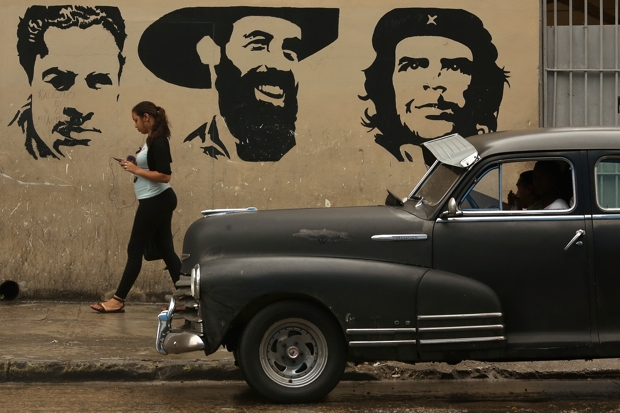Carlos Acosta, the greatest dancer of his generation, grew up in Havana as the youngest of 11 black children. Money was tight, but Carlos won a place at ballet school, and before long he was enthralling audiences at Covent Garden as a half Jagger, half Nureyev figure with a twist of the moon-walking Jackson in the mix. Now Acosta is about to leap into the world of literature with a debut novel, Pig’s Foot, written over a period of four years during rehearsal breaks. For all its manifest debt to Latin American so-called ‘magic realists’ (Marquez, Borges, Vargas Llosa), the novel stands triumphantly on its own. In pages of salty-sweetprose, it traces five generations of a black family through Cuba’s tumultuous recent history.
Acosta’s theme, broadly, is slavery. Cuba was once the greatest slave-importing colony in the Spanish empire. More than 780,000 slaves (among them, Acosta’s own forebears) were shipped in from Africa. The narrator, Oscar Cortico, is the great-grandchild of freed slaves who founded a village in the Sierra Maestra mountains called Pata de Puerco (Pig’s Foot). Why is unclear, but Oscar tells the story of his cane-cutting ancestors from within a Havana prison cell. The cell (reeking of ‘dog piss and death and despair’) is presided over by a brutish, pistol-toting cop with a fondness for electrode attachments. (You know the sort.)
In a narrative by turns lewd and poetic, Oscar guides us through Cuba’s history from the first anti-Spanish war of 1868 to the Castro revolución a century later in 1959. His grandparents, Benicio and Gertrudis, had settled in Havana in the late 1920s, we learn, when the Cuban capital was poised to become a mafia satellite of Las Vegas, with dancing girls in spangled head-dresses and nightclubs frequented by the likes of Lucky Luciano. In the go-ahead Caribbean city of big ‘Yanqui’ cars and fleshpot gambling holes, the impoverished Benicio and his wife are about as likely to succeed as a ballet dancer with a wooden leg. Under Castro, three decades later, they are seen to suffer the indignities of police surveillance and rationed food.
Their grandson Oscar, an intransigent spirit, confesses to dislike Castro and his ever-watchful police. (With perverse pride he refers to himself as a gusano or ‘worm’ — Castro-speak for a capitalist.) From his cell he continues to muse on Cuban slavery and the back-breaking labour of his forebears in the canebrakes. Times have changed, of course, but an insidious ‘shadism’ ensures that white (or near-white) Cubans inhabit the island’s upper echelons as they always have done, Oscar complains.
The novel, very nicely translated by Frank Wynne, conjures the salt-eaten arcades and collapsing promenades of Havana wonderfully. If the plot is a little hard at times to follow, Acosta makes up for this with a host of sharply drawn characters, ranging from the real-life rum magnate Emilio Bacardi to a Gargantuan bruiser nicknamed El Mozambique (who likes to hack the legs off horses with a machete).
Acosta, who was 40 last June, will soon have to say goodbye to the yellow tights and pick up the writer’s pen full time.






Comments